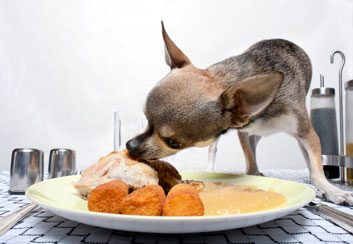5 foods you can share with your pup
Not sure if you should slip your dog table scraps? Here are some of the human foods safe for your dog to eat

Source: Best Health magazine, October 2014
Not all human food is okay for pets. Grapes and onions can be toxic, while some foods, such as cheese, can be fatty. Dr. Jim Berry, a Fredericton veterinarian, says ideal table foods for pets are low in salt and fat, high in nutrition, and should make up less than 10 percent of their diet. ‘If you’re feeding two cups of commercial dog food a day, you can give a tablespoon or two of human food with each meal,’ he says. Here are five ideas (speak to your vet about what’s good for your pet).
1. Pumpkin
Due to its high fibre content, pumpkin can help settle diarrhea and constipation. Cut it into small raw cubes, or use canned puréed pumpkin. ‘For a Labrador-size dog, try a couple of tablespoons twice a day; for a small pet, go for less,’ says Berry. Don’t give your dog too much too soon, as that can cause gastrointestinal upset such as diarrhea and vomiting, or worsen existing diarrhea.
2. Salmon
Canned salmon is a moderate-fat protein, and omega-3 fatty acids will help keep your pet’s coat shiny and healthy. Treat a large dog to two or three tablespoons (30-45 mL); a teaspoon (5 mL) will be plenty for a small dog such as a Yorkshire terrier.
3. Carrots
Bursting with fibre, raw carrots are crunchy low-calorie snacks that may help with bowel function, and remove plaque from teeth. ‘You can substitute carrots for commercial dog treats,’ says Berry. A big dog could have three or four baby carrots daily; a small dog, one or two.
4. Green beans
‘In diabetic pets, a few green beans may help control blood sugar levels,’ says Berry. Cooked or raw, they also contain fibre and micronutrients.
5. Egg
Boost your pet’s protein, folate and vitamin A intake with hard-boiled, or butter-free scrambled, eggs. Avoid raw egg and the shell; there’s a risk of salmonella. ‘Most dogs won’t get diarrhea, but they can carry salmonella on their tongue, which could in turn make you sick,’ says Berry.
This article originally appeared in the October 2014 issue of Best Health. Subscribe today to get the full Best Health experience’and never miss an issue!




